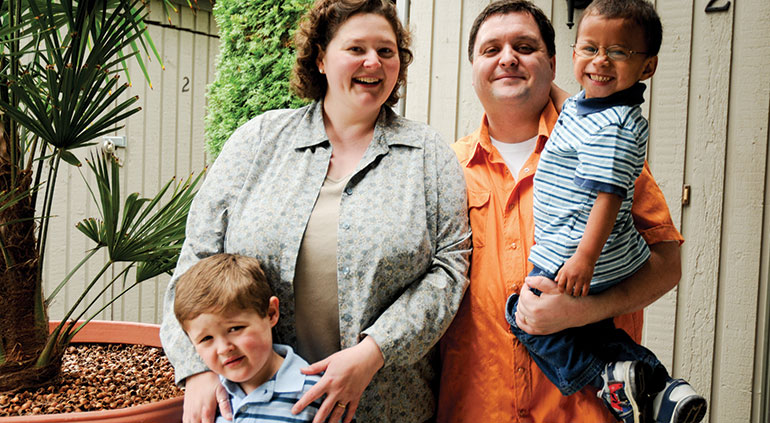“We need to get Mark something to turn his skin white, like ours,” my four-year-old son, Nate, said from the backseat. I looked in the mirror to see Mark look down at his gingerbread-colored skin. I glanced at my husband, Jason, who was driving. His eyebrows lifted, as if to ask, “How do we tackle that comment?”
Before adopting Mark from Guatemala, we knew we would become “a conspicuous family,” a term used in one of the pre-adoption classes for transracial families. We also knew that we We also knew that we–and the boys, especially as they grew older–would have to deal with comments from people who weren’t supportive of our family’s diversity. The commitment we made, from the beginning, was to address color matter-of-factly: We’re white, Mark’s Hispanic, and that’s OK.
An Eye-Opening Conversation
So there we were, bopping on the freeway, when Nate made the comment. As anyone with children knows, kids say the darnedest things at the most unexpected times. In this instance, we were on the way to the hospital, for bilateral eye surgery to correct the strabismus (crossed eyes) that had plagued Mark since birth. We decided to address Nate’s statement honestly and directly.
“Mommy has brown eyes, and I have blue eyes. Should we ‘fix’ Mommy’s eyes to be blue like mine?” Jason asked. I watched in the mirror as Nate and Mark exchanged glances. Then Nate looked down, deep in thought.
“No,” he replied. “Brown eyes are OK, too.”
“Well, so is brown skin,” I said. “What about Penny (our dog) and our kitties? They don’t look like us, but they’re a part of our family.”
“Yeah, Mark’s skin is good. I love my little brother,” Nate assured us, smiling.
As I watched Mark trace his brown arm with one finger, I felt guilt. Nate felt great, but a three-year-old saw himself in a new light, not a good one. Nate’s comment, innocent enough, implied that Mark wasn’t OK. He wasn’t like us. How was I, a white mother, to help my son be comfortable in his own brown skin when comments from my other son left me shifting in my seat?
Ironically, I’d never felt so white before in my life. Prior to bringing Mark home, I found comfort in reminding myself that we had friends from a variety of ethnic backgrounds. And as a teacher, I was no stranger to interracial conflict. I had planned to help Mark and Nate cope with the negative reactions of others. Despite that preparation, I hadn’t prepared to make Mark feel like a part of our family. I thought love would be enough, and I was wrong. It took my biological son’s comment, Mark’s looking at his skin, and my uneasiness to realize it. Mark was not an obvious part of our family. We–I–needed to be clearer in telling him that he was.
Setting Things Straight
It didn’t take long for an opportunity to present itself. Minutes later, I was checking Mark in for surgery. I helped him say goodbye to Daddy and his brother, and we were off to hospital admissions. I corrected three people within a 20-minute period. Each of them assumed that I was Mark’s foster mom. Each time, I politely pointed out that I was his adoptive mother. We were finally led to a private room. No stranger to surgery, Mark put on his surgery gown, and, together, we dressed his Elmo in a matching gown. We drew pictures and watched TV. A screaming child was wheeled out of recovery. I sat Mark on my lap, nuzzled his ear, and hummed a song to drown out the screams.
A nurse opened our door. When she addressed me as his “foster mom,” I sighed. I pulled out the original copy of Mark’s birth certificate that named me as his mother–a document the office staff had made three copies of 45 minutes ago–and said, “Could someone please correct this in his chart? I am Mark’s adoptive mother. His forever mommy.”
Suddenly, Mark twisted around to look me in the eye, dropping Elmo to the floor. He wrapped his arms around my neck, and the nurse smiled at me, as she made the note on the chart.
Color doesn’t immediately tell the story of our family, but our words–our statements to the world and to our own family–can. My gift to Mark is to be proud and honored to be his mother. And every chance I get to celebrate this by my actions–and in words–I will do so. Actions speak louder than words, but straightforward words are important, too.



